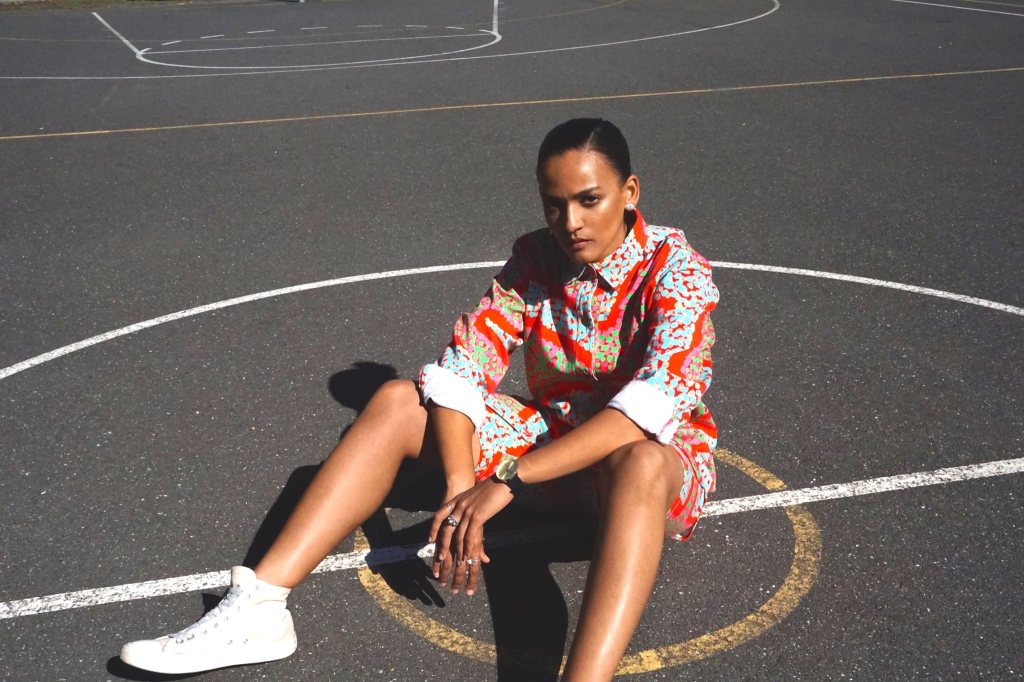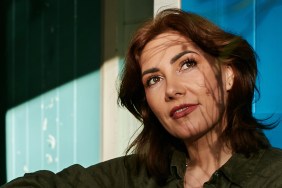Visions of women of colour on Australian stages weren’t something OKENYO had as a child. But she’s quickly learnt for herself that she doesn’t need permission. Zindzi Okenyo sings, acts and flows like an MC. She’s One of a new movement. A loose constellation of Australian women creating avenues not only for themselves but those yet to come.
There’s new possibilities for an act like OKENYO. Something she herself points out wouldn’t have been possible even five years past. But it’s happening now. Likeminded voices and righteous talents – of which collaborators on this artist’s formidable ‘Woman’s World 2.0’ Jesswar and Miss Blanks can be considered two – are embracing the new moment. They’re taking strides towards their own vision of Australian music. One which is not only more inclusive but bigger, better.
But back to the music. This artist makes statements, yet just as equally debut The Wave dives into a deeply personal space. As an actor, she’s a natural conduit. Zindzi universalises vulnerable moments as potent lyrics. The Wave packs many. Teamed with bastion of Aussie hip-hop Elefant Tracks, Okenyo is creating foundations for bolder ambitions still.
Music Feeds: Just to kick off can you tell me a little about what’s been happening since ‘Woman’s World 2.0’ and in the leadup to the new EP?
Okenyo: I can’t evener remember when ‘2.0’ came out! But since then, this year, I’ve been working for Bell Shakespeare Productions’ ‘Antony and Cleopatra’. I’ve been on that job since January. So I’ve been on tour with the show and then also writing my next EP in my spare time. It’s really cool. I actually recorded The Wave in 2017 and it was finished and everything by March last year. But just the way that it’s panned out is that ‘Woman’s World’ has kept having a new life through campaigns like WNBL and Health Victoria. We kind of just kept elongating the plan! [Laughs] But finally the EP is going to be out, which is great.
MF: “I wanna love you/But I wanna love me too.” It’s an expression which jumped out from ‘Come Through’, which is the second track on the new EP. It seems like an interesting exploration of dependence. What was running through your head when you were putting those lyrics down?
O: That song specifically is based on a personal experience. I also did a play a really long time ago for Sydney Theatre Company. It was [Federico García] Lorca’s ‘Blood Wedding’. I played a character who was just called ‘The Wife’ and essentially, she kind of represented an unrequited love. As I do with a lot of my writing I kind of took that as a starting point. But then I suppose it evolved into something else.
I guess the song is about when you really lose yourself in a deep love and the perils of that. This great enveloping feeling of being so deeply in love. But also, that you can kind of lose yourself. When I was writing the song, there was a situation I was in where it was really important to me that I remained myself, an individual. I guess I was struggling with that while also being deeply in love. It’s an exploration of that.
MF: It’s interesting that you had this narrative idea that came a little bit before the music and lyrics. Is that a common way for you to work?
O: Yeah! This doesn’t apply to every song but so far, the way that I’ve been writing the structure is a story that is very personal and authentic to me. Something in my private life that’s then framed within a story that already exists. I think that naturally, I’ve come to do that because I’m an actor as well. I have a strong sense of narrative. I suppose on the job as an actor I’m representing ‘humanity’ or ‘life’. When you go into the theatre it’s larger than life, but hopefully, we see something of ourselves in it.
It’s just been the natural way for me to write. But also, at the same time, there’s something about being an artist that’s very self-involved. I’m very aware that there’s something about being self-involved which pushes you to create really great work. I’m also really aware that I don’t want to be self-indulgent. There’s something about framing my own stuff in a bigger way that avoids that. I guess my aim is to get an authenticity across. But at the end of the day, it doesn’t necessarily matter what’s happened to me. I just want it to speak to people.
MF: I see you as occupying this interesting musical space. You’re signed to Elefant Tracks so there’s a formidable hip-hop influence – an Australian influence — at work, but just as equally there’s some R&B and ambitious electronic elements on this new EP too. How do you see it all falling into place?
O: Well it’s an interesting one. I guess when I first really started writing music, I don’t really know what genre it was. Then when I worked with Mario Späte [Badcop] on ’10 Feet Tall’ his expertise was in a lot of electronic stuff, so I was kind of in that world. Then I signed to Elefant Tracks, but I never really pictured myself as being with a hip-hop label! But it makes a lot of sense to me because I grew up on hip-hop. R&B as well.
Since I’ve been there Tim Levinson has really encouraged me. Everyone else at the label as well. He had some demos of me just mucking around with raps – which wasn’t something that I really did that much. I definitely sung more, I thought of myself as a singer. But as you’ve heard with my EP, I don’t really sing that much. So it’s quite a new endeavour, I’m really enjoying it.
In terms of writing in that way, it’s the beginning I guess. But it’s good fun. It’s very different from writing a verse structure from a vocal point of view. I’m just exploring it.
MF: So rapping – writing lyrics and working on your flow – has always been something you’ve done behind closed doors?
O: Yeah totally! I mean I remember finding Missy Elliot – she’s just one of my total idols. I know so many of her lyrics! A grew up on A Tribe Called Quest and stuff like that. Blackalicious and The Black Eyed Peas back in the day. So it’s kind of like I’ve found something which I thought was not necessarily me. Maybe I felt I didn’t have permission to do it or something. I had a lot of support and encouragement, so I was like, “Okay! I’ll give it a go.” But I’m not there. There’s a still a long way to go. But this EP? It feels like the sound of it and the feel of it feel are really right for me as an artist. It feels good.
MF: Right now, it seems like there’s a new generation of Australian acts using music as a medium to paint a more expansive and inclusive picture of what this country’s music can be. When I say this, I’m thinking about people like Jesswar and Miss Blanks – both of which you’ve collaborated with. Do you see yourself as being part of a movement or greater network of artists? How did you come into contact with Jesswar and Miss Blanks?
O: With Jesswar and Miss Blanks, I met them at BIGSOUND. But I guess I kind new them – I didn’t really know Jesswar but I knew Miss Blanks. I’d met her before. I just really loved their work and they came to see me and my show. They were supportive. When I had the idea of doing another version of ‘Woman’s World’ I originally wanted two people: A vocalist and a rapper. But that kinda didn’t work out. So it just made so much sense to me to add those two to the piece.
It’s funny because when I wrote ‘Woman’s World’ – I guess you just never know how things are going to go. When I wrote it I knew it was stating something. But I guess I just initially wrote it because I wanted to write it. It’s really amazing when people then respond. Then obviously making the second one, adding those two amazing women on there, then It becomes this thing like, “Oh wow. I am part of this thing. I am part of this movement.”
I also see it as a responsibility then when I do make music or speak publicly that I make it count. It’s such a privilege to get any kind of platform to speak. It so amazing that there’s so many different people – different minorities. People who might not have been able to have had a platform even five years ago. To see it becoming so widely diverse in that sense, I think that’s exciting. Especially in Australia.
MF: Do you see being an example to others an important part of what you do?
O: I definitely do notice that it means a lot to people for various reasons. I guess with the music that I make and even being a presenter on Play School I get a lot of letters and messages from mothers saying how much it’s important that their brown child sees someone brown on TV. It really is. I guess I’m seeing the importance.
I’m just a small cog in a whole thing, but when I relate to people in that sense or receive messages like that it makes it really, really important. I realise, “Oh I really do have a responsibility.” But it’s such a great responsibility!
MF: Are there figures from your own childhood that sparked a similar sense of possibility for you? You’ve talked about Missy Elliot, but were their figures closer to home here in Australia?
O: Well I guess that’s why I talk about that responsibility being such a privilege. I didn’t really have anyone like that growing up. I certainly didn’t have brown faces there in the media or anything like that as a young kid. Then the older I got I realised I identified as queer and there certainly weren’t people who I felt like, “Oh that’s me!” Or I could see a mirror image in or whatever.
I mean it’s interesting you know because now people are so much more open with who they are. It’s really cool that I look back and can go, “Oh I loved Missy Elliot!” But I didn’t know anything about her being bi or who she was. But I guess I was like, “Wow that’s a really strong independent woman.” You kind of feed off that, but yeah there really wasn’t. I’m lucky that I’m the youngest of four. I had really strong female sisters a lot older than me, really great people to look up to within my family. I really feel that now I can be that for some people and that’s really cool.
MF: What’s coming next? What can fans expect coming down the tracks?
O: It’s was just so great working with Lionel Towers who co-produced this EP with me. I’m going to Melbourne in about a month to work with the Melbourne Theatre Company but during that time I’ll also be working on the next EP. It’s going to come out a lot sooner than this last one. The Wave took about a year to come out! But yeah fans can expect more. Another EP super soon, by the end of the year or the beginning of the next. Now that I have this relationship with Lionel it’s going to be great to just continue, be bolder and try and be a bit riskier. Really push it. I’m really excited about the next phase.
—
OKENYO’s new EP The Wave is out now.














